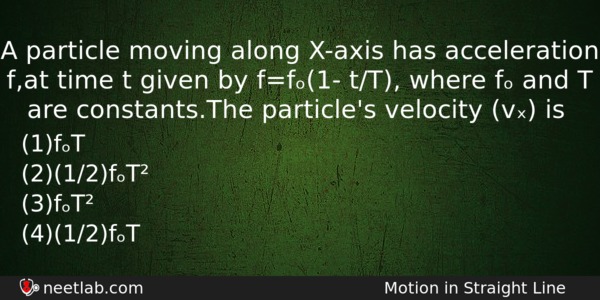| ⇦ | 
| ⇨ |
A particle moving along X-axis has acceleration f,at time t given by f=fₒ(1- t/T), where fₒ and T are constants. The particle’s velocity (vₓ) is
Options
(a) fₒT
(b) (1/2)fₒT²
(c) fₒT²
(d) (1/2)fₒT
Correct Answer:
(1/2)fₒT
Explanation:
Acceleration, f = dv/dt = f₀[1-(t/T)]
dv = f₀[1-(t/T)]dt —–(i)
On integrating Equation (i) both sides, we get
.·. v = f₀t – (f₀/T)(t²/2)dt + C —–(ii)
After applying boundery conditions v = 0 at t = 0, we get
Therefore, C = 0
v = f₀t – (f₀/T)(t²/2)dt —–(iii)
As, f = f₀[1-(t/T)]
When, f = 0,t = T
Substituting, t = T in Equation (iii), then velocity
vₓ = f₀T – (f₀/T)(T²/2)
= f₀T – (1/2)f₀T = (1/2)fₒT
Related Questions: - The temperature coefficient of a resistance wire is 0.00125 per degree.
- The radius of a ball is(5.2±0.2)cm.The percentage error in the volume of the ball
- The maximum number of possible interference maxima for slit-seperation equal to
- A plumb line is suspended form a ceiling of a car moving with horizontal acceleration
- If 10000 V is applied across an X-ray tube, what will be the ratio of de-Broglie
Topics: Motion in Straight Line
(93)
Subject: Physics
(2479)
Important MCQs Based on Medical Entrance Examinations To Improve Your NEET Score
- The temperature coefficient of a resistance wire is 0.00125 per degree.
- The radius of a ball is(5.2±0.2)cm.The percentage error in the volume of the ball
- The maximum number of possible interference maxima for slit-seperation equal to
- A plumb line is suspended form a ceiling of a car moving with horizontal acceleration
- If 10000 V is applied across an X-ray tube, what will be the ratio of de-Broglie
Topics: Motion in Straight Line (93)
Subject: Physics (2479)
Important MCQs Based on Medical Entrance Examinations To Improve Your NEET Score
18000+ students are using NEETLab to improve their score. What about you?
Solve Previous Year MCQs, Mock Tests, Topicwise Practice Tests, Identify Weak Topics, Formula Flash cards and much more is available in NEETLab Android App to improve your NEET score.
Share this page with your friends

Leave a Reply